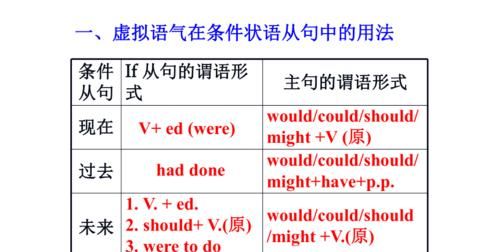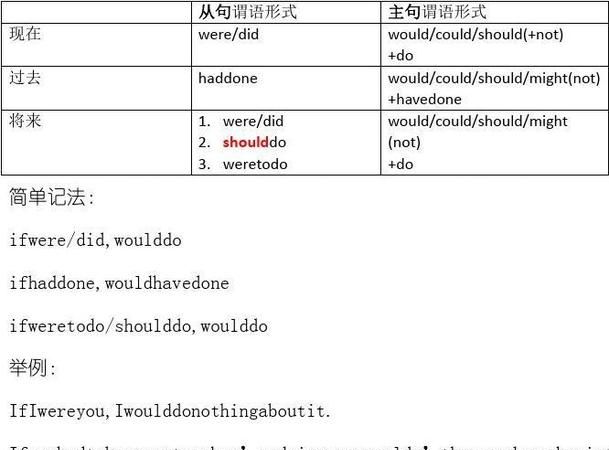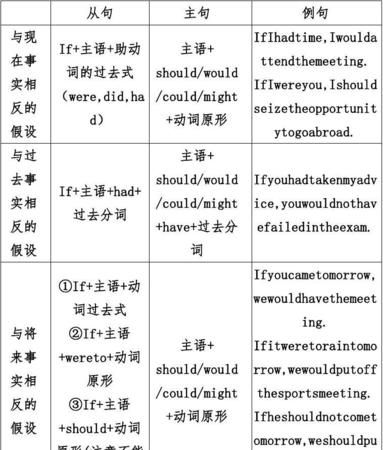本文目录
英语虚拟语气语法总结思维导图
英语虚拟语气语法总结如下:
1.虚拟语气是说话者用来表示一种假想,或者难以达到的情形,而非客观存在的事实。
2.虚式语气在条件句中的使用:条件句有真实条件句和虚拟条件句。当主句不需要虚拟语气时,真实条件句所表示的假设是可能的,而虚拟条件句则表示与事实相反或不太可能发生的假设,此时使用虚拟语气。
3.与过去事实相反,条件从句的谓语用过去完成时(had+过去分词),主句谓语用 should (would, could, might)+ have+过去分词。

注意:
1. wish和 hope接宾语从句的区别在于: hope表示一般可实现的希望;宾语从句用陈述语气。wish表示难以或不可能实现的希望,宾语从句使用虚拟语气。
2. if only同 I wish一样,用于表示与事实相反的愿望, wish后的虚拟语气与 wish后所接时态相同。
3. I wouldrather句用虚拟语气仅分现在和过去。
当 would rather、 would sooner、 would just as soon之后的 that从句中,句子谓语习惯上要使用虚拟语气,表示"想做什么"。
4.as if (though)从句的虚拟语气。
由 as if (as though)引导的方式状语从句或表语从句,有时是虚拟语气,与 wish用法相同。
if虚拟语气的三种用法
条件句中虚拟语气的形式
从句中提出一种与客观现实不相符或根本不可能存在的条件,主句会产生的一种不可能获得的结果.条件句中的虚拟语气根据不同的时间有三种不同的形式.
时间 从句谓语形式 主句谓语形式
将来 动词过去式(be用were)
should + 动词原形
were to + 动词原形
would / should / might / could + 动词原形
现在 动词过去式(be 用 were) would / should / might / could + 动词原形
过去 had +动词过去分词 would / should / might / could have + 动词过去分词
2.条件中的虚拟语气的举例
(1) 将来时的条件句中的虚拟语气.如:
If he should go to Qing Hua University,he would make full use of his time.如果他要上清华大学的话,他就会充分利用他的时间了.
If he were to come here,he would tell us about it.如果他要来的话,他会通知我们一声.
(2) 现在时的条件句中的虚拟语气.如:
If he were free,he would help us.要是他有空的话,它会帮助我们的.
If he studied at this school,he would know you well.如果他在这所学校学习的话,它会对你很熟悉.
(3) 过去时的条件句中的虚拟语气.如:
If I had seen the film,I would have told you about it.我如果看过这场电影,我会把电影内容告诉你了.
If I had got there earlier,I would have met Mr.Li.如果我早点到那儿,我就会会到了李先生.
3.运用条件句中的虚拟语气时,须注意的几个问题
(1) 当从句的主语为第三人称单数时,谓语动词若是系动词be时,可用was代替were.但在倒装虚拟结构及if I were you,as it were中,只能用were.如:
Were I ten years younger,I would study abroad.要是我还年轻十岁的话,我会去国外学习.
If I were you,I would try my best to grasp the chance.要是我是你的话,我要尽力抓住这次机会.
(2) 有时,虚拟条件句中,主、从句的动作若不是同时发生时,须区别对待.
①从句的动作与过去事实相反,而主句的动作与现在或现在正在发生的事实不符.如:
If I had worked hard at school,I would be an engineer,too.如果我在学校学习刻苦的话,我现在也会使工程师了
If they had informed us,we would not come here now.如果他们通知过我们的话,我们现在就不会来这里了.
②从句的动作与现在事实相反,而主句的动作与过去事实不符.如:
If he were free today,we would have sent him to Beijing.如果他今天有空的话,我们会已经派他去北京了.
If he knew her,he would have greeted her.要是他认识她的话,他肯定会去问候她了.
③从句的动作与过去发生的情况相反,而主句的动作与现在正在发生的情况相反.如:
If it had not been raining too much,the crops would be growing much better.如果天不下太多的雨的话,庄家会长得更好.
If he had been working hard,he would be working in the office now.要是他工作一直努力的话,他现在已进了办公室了.
(3) 当虚拟条件句的谓语动词含有were,should,had时,if可省略,而将were,should,had等词置于句首.如:
Should he agree to go there,we would send him there.要是他答应去的话,我们就派他去.
Were she here,she would agree with us.如果她在这儿的话,她会同意我们的.
Had he learnt about computers,we would have hired him to work here.如果她懂一些电脑知识的话,我们会已经聘用他来这里工作了.
(4) 有时,句子没有直接给出假设情况的条件,而须通过上下文或其他方式来判断.如:
I would have come to see you,but I was too busy.我本该来看你了,然而我太忙了.
But for his help,we would be working now.要不是他的帮助,我们还会在工作呢.
Without your instruction,I would not have made such great progress.要是没有你的指导,我不会取得如此大的进步.
(5) 有时,虚拟条件句中,主、从句可以省略其中的一个,来表示说话人的一种强烈的感情.
①省略从句
He would have finished it.他本该完成了.
You could have passed this exam.你应该会通过这次考试了.
②省略主句
If I were at home now.要是我现在在家里该多好啊.
If only I had got it.要是我得到它了该多好啊.

英语中虚拟语气的具体句式和句型讲解视频
一、词的语气
指我们平常说的说话人说话的口气。(在英语中,语气除了指语调以外,最主要的是通过动词发生变化而表示不同语气)
英语中的语气分为三类:
陈述语气(用于陈述句、疑问句、感叹句)
祈使语气(用于祈使句)
虚拟语气(用于条件状语从句、宾语从句等)
[编辑本段]二、虚拟语气
1) 虚拟语气概念
虚拟语气用来表示说话人的主观愿望或假想,所说的是一个条件,不一定是事实,或与事实相反。
2) 在条件句中的应用
条件句可分为两类,一类为真实条件句,一类为非真实条件句。非真实条件句表示的是假设的或实际可能性不大的情况,故采用虚拟语气。
[编辑本段]三、虚拟语气在非真实条件状语从句中的用法
1、真实条件状语从句与非真实条件状语从句
eg .
If he doesn’t hurry up, he will miss the bus. ( 真实条件状语)(不是虚拟语气)
If he was free, he would ask me to tell stories. (真实条件状语)(不是虚拟语气)
If I were you, I would go at once. (非真实条件状语从句)
If there were no air, people would die. (非真实条件状语从句)
总结就是 四个字:主将从现,主句用将来时,从句用一般现在时。
2、虚拟语气在非真实条件状语从句中的用法及动词形式
① 表示与现在事实相反的情况
(条件)从句谓语动词形式 主句谓语动词形式
谓语动词用一般过去式
(be用were) should/would/could/might+动词原形(过去将来时)
eg.
If I were you, I would take an umbrella.如果我是你,我会带把伞。(事实:我不可能是你)
If I knew his telephone number, I would tell you. 如果我知道他的电话号码,我就会告诉你。(事实:不知道)
If there were no air or water, there would be no living things on the earth. 如果没有水和空气,地球上就不会有生物。(事实:地球上既有空气也有水)
If I had any money with me, I could lend you some. 如果我带钱了,我就会借给你些。(事实:没带钱)
If he studied harder, he might pass the exam.如果他在努力些,就能通过考试了。(事实:学习不用功)
②表示与过去事实相反的情况
从句谓语动词形式 主句谓语动词形式
Had+过去分词(过去完成时) Should/would/could/might+
have+过去分词(现在完成将来时)
eg. If I had got there earlier, I should/could have met her. 如果我早到那儿,我就会见到她。(事实:去晚了)
If he had taken my advice, he would not have made such a mistake. 如果他听我的劝告的话,就不会犯这样的错误了。(事实:没有听我的话)
③表示对将来情况的主观推测(可能相反或可能性很小)
从句 主语 例句
If+主语+ ① should+动词
② did
③were to do
(①通常与一个表示时间状语连用)其 中were to do可能性最小,
should/would/
could/might+动词原形
If it rained tomorrow our picnic would be put off.
万一那天下雨,我们的郊游
就推迟。
eg.If he would come here tomorrow, I should/would talk to him. 如果他哪天来这儿的话,我就跟他谈谈。(事实:来的可能性很小)
If there were a heavy snow next Sunday, we would not go skating. 如果下周日下大雪,我们就不能去滑冰了。(事实:不知能否下雪)
If she were to be there next Monday, I would tell her about the matter. 如果她下周一来这儿的话,我就会告诉她这件事得始末。
[编辑本段]四、虚拟语气的其他用法
①、虚拟语气用在wish 后的宾语从句
a、表示与现在事实相反的愿望,谓语动词用过去式
eg. I wish I had your brains.我希望我有你那样的头脑。(事实:我根本比不上你)
b、表示过去事实相反的愿望,谓语动词:had+v-ed
eg:.I wish I had known the truth of the matter.我希望我原来知道这件事的真相。(事实:原来不知道)
c、表示将来难以实现的愿望
谓语动词:should/would + 动词原形
eg. I wish I should have a chance again.我希望我还能有一次这样的机会。(事实:很难再有这样的机会了)
②虚拟语气用在suggest(建议)、insist(坚持)、demand(要求)、order(命令)等动词后的宾语从句中。
在这种用法中,无论主句谓语动词为何种时态,从句的谓语动词都用:“should + 动词原形”或只用“动词原形”。
如 He suggested that we (should) take the teacher’s advice
He insisted that we (should) take the teacher’s advice
He demand that we (should) take the teacher’s advice
He ordered that we (should) take the teacher’s advice
③虚拟语气在方式状语从句的应用。详百度百科之方式状语从句词条,已经讲的很清楚,这里就不粘贴了。

英语语法虚拟语气的用法总结
虚拟语气
一、考点聚焦
1、虚拟语气用于条件状语从句中
(1)表示与现在事实相反的假设,条件状语从句中的谓语动词用“过去式(be动词的过去式用were)”,而主句中的谓语动词用“would / should/ could / might + 动词原形”.如:
If I were a boy,I would join the army.
If the had time,she should go with you.
(2)表示与过去的事实相反,条件状语从句中的谓语动词用过去完成时,主句中的谓语动词则用“would / should / might / could + have +过去分词”.如:
If he had taken my advice,he would have succeeded in the petition.
(3)表示与将来事实相反,条件状语从句中的谓语动词一般过去时或should(were to) + 动词原形,而主句中的谓语动词则用would / should/
could might + 动词原形.如;
If it were to rain tomorrow,the football match would be put off.
(4)当条件状语从句表示的行为和主句表示的行为所发生的时间不一致时,动词的形式要根据它所表示的时间作相应调整.如:
If they had worked hard,they would be very tired.(从句说的是过去,主句指的是现在)
以下表格是虚拟语气用于条件状语从句中时,主句和从句谓语动词的形式:
条件状语从句 主 句
与过去事实相反 had + 过去分词 should /would/could/might + have + 过去分词
与现在事实相反 一般过去时(be用were) would/should/could/might + 动词原形
与将来事实相反 一般过去时或should(were to) + 动词原形 Would/should/cold/might + 动词原形
有时侯在使用时可省略if,句子则可换成下列形式,即“were / had / should +主语”.如:
Were I a boy,I would join the army.
Had he taken my advice,he would have succeeded.
Were it not for the expense,I would go to Britain.
2、虚拟语气用于名词性从句
(1)虚拟语气在宾语从句中的运用.
①“wish + 宾语从句”表示不能实现的愿望,译为“要是……就好了”等.表示现在不能实现的愿望,从句中的谓语动词用一般过去时;表示将来不能实现的愿望,从句中的谓语动词用“would/could + 动词原形”;表示过去不能实现的愿望,从句中的谓语动词用“had + 过去分词”或“could(should) + have + 过去分词”.如:
I wishit were springall the year round.
I wishI had known the answer.
I wishI could fly like a bird.
②在表示建议、要求、命令等的动词suggest、advise、propose、demand、require、insist request、mand、order等后的宾语从句中,谓语动词用should + 动词原形或是动词原形.如:
She suggested we (should)leave here at once.
The doctor ordered she should be operated.
(2)虚拟语气在同位语从句和表语从句中的运用.
作表示建议、要求、命令等的名词advise、idea、order、demand、plan、proposal、suggestion、request等的表语从句和同位语从句,从句中的谓语动词用“(should) + 动词原形”.如:
His suggestion that we (should)go to Shanghai is wonderful.
My idea is that they (should)pay 100 dollars.
(3)虚拟语气在主语从句中的运用.
在主语从句中,谓语动词的虚拟语气用“should + 动词原形”的结构,表示惊奇、不相信、理应如此等.如:
It is necessary(important,natural,strange,etc.)that we should clean the room every day.
It was a pity (a shame,no wonder,etc.)that you should be so careless.
It will be desired(suggested,decided,ordered,requested,proposed,etc.)that she should finish her homework this afternoon.
注意:这种从句表示的是事实.如果说人对这种事实表现出惊奇的情感,就可用虚拟语气.反之,如果不表示惊奇等情感,that从句也可用陈述句语气.如:
It is pity that you can’t swim.
3、虚拟语气在其他场合的运用
(1)虚拟语气在as if/as though、even if/even though等引导的表语从句或状语从句中,如果从句表示的动作发生在过去,用过去完成时;指现在状况,则用一般过去时;指将来状况则用过去将来时.如:
He did it as if he were an expert.
Even if she were here,she could not solve the problem.
(2)虚拟语气用于定语从句中.
这种从句常用于句型“It is (high)time (that) … ”中,定语从句的谓语动词用一般过去时(be用were)或should + 动词原形,意思是“(现在)该……”.如:
It’s time that I picked up my daughter.
It’s high time we were going.
(3)虚拟语气用在if only引导的感叹句中.如:
If only I were a bird.
If only I had taken his advice.
(4)虚拟语气在一些简单句中的运用.
①情态动词的过去式用于现在时态时,表示说话人谦虚、客气、有礼貌或语气委婉,常出现在日常会话中.如:
It would be better for you not to stay up too late.
Would you be kind enough to close the door?
②用于一些习惯表达法中.如:
Would you like a cup of tea?
I would rather not tell you.

以上就是关于英语虚拟语气语法例句,英语虚拟语气语法总结思维导图的全部内容,以及英语虚拟语气语法例句 的相关内容,希望能够帮到您。
